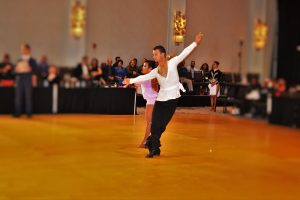Dangers of Perfecting Your Dance Moves, North Shore Dance Society
Everyone wants a flawless performance. I get it. Isn’t that why dancers practice hundreds of hours? Well… to a certain degree, yes, but too much focus on a flawless performance can actually hurt your dancing. In this article, I’m addressing the technical dancers, aka the perfectionists. Technical abilities can be a great asset, as long as you’re careful not to fall into theses 3 traps of extreme perfectionism:

1 – Precision at the Expense of Balance
Although balance requires a certain amount of precision – a clear sense of body alignment and clear pathways of movement in space – it relies even more heavily on your ability to adapt to change. Balance is dynamic, not static.
When you control your movement too much, trying to be super precise, your muscles tighten and you lose your ability to quickly adapt. For example, it may seem counterintuitive but whenever you feel off balance, instead of trying to “control” your movement and tighten your muscles, release your muscles and you will find that you easily regain your stability.
2 – Perfection over Connection
At some point in your dancing, I’m sure you’ve all experienced the icy glare of your partner, blaming you for a loss of connection. When you focus too much on perfecting your choreography, you become less receptive to lead and follow cues.
When your movement is over-controlled and stiff, it is less reflexive and you cannot quickly adapt to new information (i.e. change in lead, direction, etc…). Also, if you have practiced your routine perfectly for hours and hours, any change will likely throw you off and you’ll either make a mistake or you’ll go blank and forget your routine.
Expect that your routine will change slightly when you perform. Dedicate time to sensing lead and follow with your partner and playing around with it. (emphasis on “play”!) It’s a smart move to purposely have your partner change the routine here and there in practice to check your ability to adapt.
3 – Clean But Boring
As a naturally technical dancer myself, I must admit that I love to watch beautifully executed technique. However, expressive dancing (that is also technically sound) steals away my attention very quickly.
Have coaches ever told you that you “think too much” or (even more heart- wrenching) “you’re boring to watch?”. This is like taking a knife to the heart when you work so hard to master you craft in hopes of becoming a champion. To stop overthinking and deliver an expressive performance, you need to shift your mindset from perfection to play. Performing is like playing. There are no hard and fast rules in play or if there are, the rules constantly change. Play is free. Play is adaptive. Play is relaxed. Play requires room for error. An attempt to dance perfectly kills play.
As part of your practice, take some time to move playfully to music and sense the feeling of the music (no choreography or steps!). By allowing your body the freedom to move without structure, you will learn to trust it and in trusting your body, you will be able to free your mind and can express what you feel in the music.

A great dancer is not one who dances flawlessly, but rather one who creates the illusion of dancing flawlessly. To create this illusion, you need to become a master at adapting, rather than perfecting.
Author: Amber Copeland
North Shore Dance Society